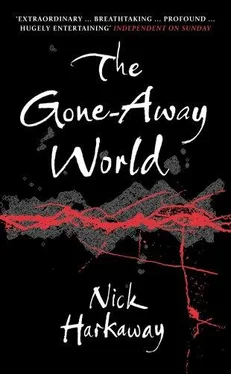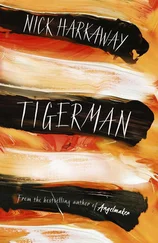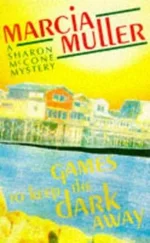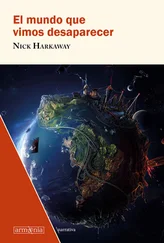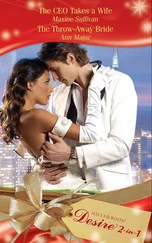Nick Harkaway - The Gone-Away World
Здесь есть возможность читать онлайн «Nick Harkaway - The Gone-Away World» весь текст электронной книги совершенно бесплатно (целиком полную версию без сокращений). В некоторых случаях можно слушать аудио, скачать через торрент в формате fb2 и присутствует краткое содержание. Жанр: Фантастика и фэнтези, Фэнтези, на английском языке. Описание произведения, (предисловие) а так же отзывы посетителей доступны на портале библиотеки ЛибКат.
- Название:The Gone-Away World
- Автор:
- Жанр:
- Год:неизвестен
- ISBN:нет данных
- Рейтинг книги:4 / 5. Голосов: 1
-
Избранное:Добавить в избранное
- Отзывы:
-
Ваша оценка:
- 80
- 1
- 2
- 3
- 4
- 5
The Gone-Away World: краткое содержание, описание и аннотация
Предлагаем к чтению аннотацию, описание, краткое содержание или предисловие (зависит от того, что написал сам автор книги «The Gone-Away World»). Если вы не нашли необходимую информацию о книге — напишите в комментариях, мы постараемся отыскать её.
The Gone-Away World — читать онлайн бесплатно полную книгу (весь текст) целиком
Ниже представлен текст книги, разбитый по страницам. Система сохранения места последней прочитанной страницы, позволяет с удобством читать онлайн бесплатно книгу «The Gone-Away World», без необходимости каждый раз заново искать на чём Вы остановились. Поставьте закладку, и сможете в любой момент перейти на страницу, на которой закончили чтение.
Интервал:
Закладка:
“Tool of war. Very respectable. Man’s work.” He grimaces. “Or you could say, a butcher’s knife! It is very sharp,” says Wu Shenyang, “and very old. Take it and tell me what you feel.” He steps towards me, extending the hilt, and somehow his bad leg slips as he moves across the slick patch of carpet. The Tool of War is launched into the air, slowly rotating around the point where his hand released it, until (I am relieved to notice, though I have not yet had time to move) it points away from me. Wu Shenyang’s body hurtles forward, almost a dive, and I realise that the hilt of the weapon, striking my chest, will propel the blade into him. It is therefore incumbent upon me to move, and I do. The sword’s top edge is blunt, so I stroke it with my right palm, pushing the point outside our circle, and step forward and bend both knees, back straight, to support the old man as he tumbles.
He does not tumble. His bad leg stretches out and takes the weight easily, and the blade, recaptured without fuss, swooshes through the air in a fluid, whirring spiral and returns to the sheath. Instead of his weight falling across my arms and being absorbed—somewhat—by my legs, the barest of contacts bespeaks his passing, and he emerges from the swirl standing by the door. I look down. My feet are spread in what is called a horseriding stance, my arms are extended above them, palms up and bent at the elbow.
“It is called Embrace Tiger, Return to Mountain,” Master Wu says after a moment. “Practice.” But it is only when the girl emerges from behind the sofa and with enormous gravity shakes my hand that I realise I have been accepted as a student, and that somewhere, somehow, it all went right.
“Elisabeth is my secretary,” Master Wu says, without a hint of laughter. “She is quite stern, but as long as you are well behaved, you will get along fine.”
And so it proves. Elisabeth is a small blonde person who rarely speaks, but she orders the arrangements of the House of the Voiceless Dragon with the absolute certainty which is the preserve of ladies of that age, and she studies the forms with the other students and lives on the couch because her mother is too busy to take care of her. Master Wu is utterly obedient to her tyranny and she, in turn, takes care to exercise her power with great subtlety and discretion and even—amazingly—mercy. And sometimes, when Master Wu is lonely or homesick or simply tired, she makes spiced apple cake or Char Siu Bao, and we all eat them together, which helps. Together, because somehow or other I have been adopted again, and now I must split my time between Gonzo and Master Wu.
Voiceless Dragon is taught every morning and evening at seven, and at weekends all day, and students come when they can and stay for at least an hour. During the week, Master Wu composes calligraphy and reads a great many books, so that he knows a great many higgledy-piggledy things about a great many subjects, and some of these things are useless and some are not, but almost all of them find their way into the lessons. Thus along with the Elvis Walk, we have Lorenz Palace Step (mathematical gong fu ) and Vetruvian Fist (da Vinci gong fu ), and—until Elisabeth intervenes—Fallopian Tube Arm (the name culled from a diagram in my biology textbook, chosen for the shape of the elbow in the final posture, but rather alarming). I study whenever I can, and for some reason however much time I waste when I should be doing homework, my school grades go up rather than down through my association with Master Wu. I worry at first that Gonzo will be resentful of my absences, but he is busy with other matters, and certain of his activities require personal space.
In March, Master Wu has an unwelcome visitor, a man called Lasserly who travels all the way from Newport. Lasserly is a forceful person with a big, florid head. His arms are very thick, and he smells of old canvas. He wants to learn the Secrets. Every student of any martial form knows about the Secrets. They are rumoured and scorned across the world. Students are encouraged by some teachers to believe that knowledge of the Secrets will allow a practitioner to defeat age and death, hold his breath for hours on end, and project his spirit out of his body to smite his opponents like a Flash Gordon ray gun. Other masters, more down-to-earth or more honest, aver that the Secrets are symbolic, representing way stations on the journey of the self, or particularly important stylistic elements for the advanced student. Master Wu tells Lasserly that there are no Secrets.
“Come on,” Lasserly says. “Of course there are.”
No, Master Wu says gently, really, there aren’t.
“You know things,” Lasserly says.
That is undoubtedly true. And almost certainly, Master Wu allows, he knows things—even gong fu things—which Lasserly does not. But he doesn’t feel inclined to talk about these things with Lasserly, because Lasserly is somewhat abrasive and even rude, and Master Wu has nicer people to spend time with.
“Well, okay then. Let’s fight instead.”
This is preposterous, on the face of it. Lasserly outweighs Master Wu by a hundred pounds, and his hands are thick with calluses from long practice.
No, Master Wu says after a minute or so of silence. No point.
Lasserly walks out. On his way, he puts his immense finger on my chest. I feel the solidity of him, his body lined up behind the touch. He could channel his whole weight through that finger, probably punch it right through me. I shouldn’t have let him get that close.
“You’re wasting your time,” Lasserly snarls. “This guy doesn’t know any Secrets.” And he walks out, slamming the door so that the china ducks wobble against the plaster.
We practise in silence. Master Wu looks very sad.
On the night of this dark day, when Master Wu has finished wrapping himself around his third slice of apple cake, and is contemplating the advisability of wrapping himself around a fourth, Elisabeth is moved to ask him about Lasserly. The question starts as a curiosity, but by the time she has finished asking it her voice has risen because she cannot hold in her fury any longer, or her shame.
“Why didn’t you fight him?” And then she hears her own question and is abashed.
Master Wu shrugs. “Mr. Lasserly wanted to know if I knew Secrets,” he says. “He wanted to fight me so that he could find out. And now he thinks he knows the answer. He knows that I was so absolutely sure of which way it would go that I didn’t want to fight him.”
“But he thinks he would have won!” And this, in the end, is the heart of the matter, because in Lasserly’s certainty our own is eroded.
“Oh, goodness me,” says Master Wu, with vast sincerity, “I didn’t mean for him to have that impression at all!” He opens his eyes very wide, as if realising for the first time how it must have looked. “Oh dear! I am so clumsy ! Do you think I should call him and tell him that I would have beaten him because he has stiff legs, moves like a cow and tenses his shoulders? But,” says Master Wu happily, “he didn’t leave a number. Well, never mind.” And he laughs. “There are no Secrets,” he says, “but there are lots of things I don’t feel like telling someone like Mr. Lasserly. That’s not how you keep Secrets at all—not,” Master Wu says, with great delight, “that there are any.”
“Are there? Secrets?”
“Secrets?” Master Wu says, as if he’s never heard of any such thing. Elisabeth looks at him sternly.
“Yes,” she says. “Inside-the-door. Inner Teachings.”
“Oh,” says Master Wu, “those Secrets.” And he smiles.
“Those Secrets,” Elisabeth repeats a moment later, when Wu Shenyang’s eyes once again roam in the direction of the apple cake, and she realises that the expression of deep division on his face relates to it, and not to the arcana of the chi.
Читать дальшеИнтервал:
Закладка:
Похожие книги на «The Gone-Away World»
Представляем Вашему вниманию похожие книги на «The Gone-Away World» списком для выбора. Мы отобрали схожую по названию и смыслу литературу в надежде предоставить читателям больше вариантов отыскать новые, интересные, ещё непрочитанные произведения.
Обсуждение, отзывы о книге «The Gone-Away World» и просто собственные мнения читателей. Оставьте ваши комментарии, напишите, что Вы думаете о произведении, его смысле или главных героях. Укажите что конкретно понравилось, а что нет, и почему Вы так считаете.
